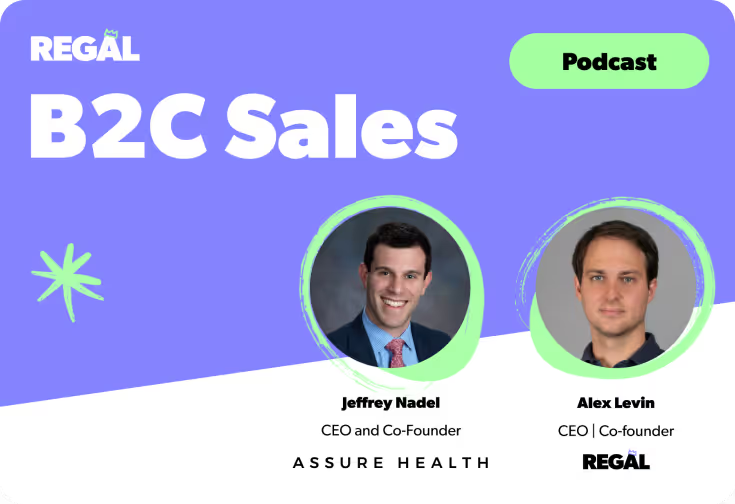
September 2023 Releases
In this fireside chat, Regal.ai Co-Founder & CEO Alex Levin sits down with Kin Insurance’s Austin Ewell and a360inc’s Henry Davidson to share how their organizations are using AI agents to transform outreach, customer experience, and operational efficiency. They discuss real-world deployments—from qualification and human agent handoffs to complex negotiation workflows—break down the results, and offer practical guidance for leaders adopting AI agents at scale.
Artificial intelligence has long held promise for customer operations teams, but the reality has too often fallen short. In this fireside chat, Regal’s Co-Founder & CEO Alex Levin sat down with Austin Ewell (Senior Analyst, Kin Insurance) and Henry Davidson (EVP Business Development, a360inc) to explore how their companies are successfully deploying AI agents in real customer-facing scenarios. They shared how they identified the most impactful challenges, worked hand-in-hand with the Regal team to design and deploy their AI agent, and the key lessons leaders should take from that experience.
Before adopting AI agents, both Kin and a360inc relied almost entirely on their human teams to handle customer interactions. At a360inc, that work centered on notary outreach and fee negotiation—calls that determined availability, confirmed details, and negotiated the rate a notary would accept for each signing. Henry recalled that “it was a lot of human phone calling… a big staff and very difficult to manage,” especially with volume that swung up and down unpredictably. “Morale was down because of the repetitive nature of the work,” he said, noting how difficult it was to train and retain staff under those conditions. For Henry, the realization emerged as the business grew: “We have to do something different, because if the business continues to grow as we want to grow it, this is just gonna become very difficult to manage.”
Kin arrived at the same conclusion from a different starting point. Austin explained that the company’s service model involved a wide mix of channels—SMS, email, chat, and especially phone—all staffed by human agents who were expected to handle every type of inquiry. As their customer base expanded, workforce management became increasingly complex, from schedule management to occupancy and utilization levels, and ensuring consistent service quality became harder. “We really pride ourselves on the ability to serve our customers quickly and serve them fast,” he said, but as volume increased, it became harder to deliver the consistently fast, high-quality experience they set as their standard.
When evaluating vendors, both teams gravitated toward Regal because of its collaborative approach around deploying and optimizing AI agents.
For Kin, the choice of vendor came down to shared philosophy and transparency. Austin explained that AI is evolving so quickly that maintaining an in-house, cutting-edge system would require “substantial investment in both time and resources to maintain this leading edge… and use it effectively.” While Kin could have taken that on, he said a third-party partner offered far greater flexibility by giving them access to specialists “already dedicated to mastering this technology.” That allowed Kin’s internal team to “remain laser-focused on our number one priority, which is our customers at the end of the day.” Austin explained that the company is intentional about every tool they adopt and is always looking for ways to “leverage [each] technology to its fullest potential to enhance the customer experience.” Regal rose to the top because, as he put it, “we found that you guys shared that same commitment.” In addition, Austin shared that Kin explicitly wanted to avoid solutions where they couldn’t see what was happening under the hood. “We didn’t want a black box vendor who would prioritize their own mission over ours,” he said. Regal’s team embraced that expectation—openly demonstrating new features, walking Kin through how the technology worked, and giving them the confidence to deploy it effectively.

That same sense of partnership was immediately apparent to a360inc. Henry said the difference was obvious from the very first call, describing “the excitement of the Regal team… and the eagerness to really develop it out.” Regal welcomed detailed feedback and moved quickly; after he shared his initial scripts, Henry recalled that “within a day [Regal] sent me an email and said, ‘Call this number, try it out,’” already producing a functional prototype. From there, the collaboration only deepened. Henry explained that he could tell early on that Regal would be a true partner—“wanting the feedback, taking the criticism, fine-tuning the agent”—and that willingness to iterate was essential to shaping their highly specific negotiation use case.
Once implementation began, both teams were surprised by how quickly things moved and how collaborative the process felt. For a360inc, Henry described the rollout as “a very collaborative effort,” with weekly working sessions and near-daily changes. They refined everything from negotiation ranges to how the agent confirmed appointment details, ultimately making “at least 35 changes to the agent.” What stood out most was the speed: when Henry emailed a request, “the next morning I’d have an email: ‘Hey, that’s been implemented. Check it out.’”
Kin followed a structured four-phase approach—brainstorming, building, testing, deploying—while Regal remained deeply involved at every step. Austin highlighted that “Regal support has been stellar throughout the entire process,” involving account managers, TAMs, engineers, and even executive leadership. Regal’s COO and CTO joined sessions, “making recommendations, providing information,” and testing the agent alongside Kin’s team.
Customization quickly became an important part of the build for both teams, especially as they experimented with how the AI should sound and behave. Austin shared that “the world is really your oyster in terms of customization… you can give it all sorts of different styles and tone instructions so it behaves like your customers want it to behave,” while still ensuring the agent stays “really open and honest” when customers ask whether it’s AI. Henry explained that his team tested everything from lighthearted to businesslike tones and that “it was actually one of the more fun parts of development with Regal.” They wanted the agent to strike the right balance—“very professional, but lighthearted… have a good day… maybe tell some jokes”—and were surprised by the level of control they had: “We played with the personality of the agent quite a bit… and I was amazed at how fine you can tune its personality.”
For both organizations, the process didn’t feel like configuring a vendor product—it felt like building something together.
For a360inc, the most striking result was how well the AI handled complex negotiation—something Henry initially doubted. “I didn’t know if an AI agent could do it,” he admitted. But once deployed, the impact was immediate: “She’s our best employee.” The agent now takes on the most demanding parts of the workflow, using real-time data on local fees, agent density, and transaction types to negotiate confidently and consistently.
Henry noted that the AI outperforms human schedulers because “she operates at a far better percentage… than what the humans do,” especially in a role that requires so many daily negotiations. The AI stays upbeat and efficient—“friendly, quickly, professionally, and it’s that way every time”—which notaries have responded to surprisingly well. Henry shared that “they prefer to deal with [the AI], because it’s so widely accepted now,” appreciating the agent’s predictability and politeness.
.png)
Kin saw equally meaningful gains on the customer-experience side. Austin reported that “around 95% of these calls go exceptionally well,” and even when customers realize they’re speaking with an AI, the interaction typically continues without friction—they simply want accurate information, quickly. On the operations front, the impact was immediate. As Austin put it, “Our wait times get reduced. Our handle times get reduced,” and the team has been able to deliver the consistent, high-quality experience they aim for at scale.
Even with successful deployments, both companies emphasized that some challenges persist. For Kin, the biggest hurdle is scaling QA. Austin noted that while Regal’s conversation intelligence tools help tremendously, “the biggest challenge is how do we scale our QA more effectively so we can… build our confidence in the agent’s performance.”
For a360inc, the biggest challenge was cultural. Henry recalled demoing the first version of the agent and hearing silence before someone asked, “So are we letting people go?” But as soon as the team saw the agent relieve them of the most tedious tasks, their concerns shifted to relief. As Henry explained, “This was simply gonna help people to do their job better.” Removing the repetitive calls “freed them up to do more rewarding work.”
When reflecting on the success of their AI agent implementations, both leaders emphasized the importance of experimenting early and openly. Henry encouraged teams not to underestimate the technology’s capabilities, saying that “if you’re not sure if AI can handle this for you… I would bet dollars to donuts there’s a solution.” In his view, hesitation—not complexity—is the real barrier, and the companies that move forward are the ones that uncover what’s truly possible.
Austin echoed that mindset, urging teams to move quickly rather than waiting for perfect certainty: “Jump right in, and don’t let the fear of the unknown prevent you from getting started.” The sooner teams begin experimenting, he explained, the sooner they learn where AI delivers the most value and where human expertise makes the biggest impact.
Despite operating in different industries, Henry and Austin’s experiences highlight a common truth: AI agents create the greatest value when they take on repetitive, high-volume work and allow human teams to focus on higher-quality interactions. The organizations that win are the ones willing to iterate, stay transparent, and choose a partner committed to building alongside them.
Ready to explore what Voice AI Agents can unlock for your business? Schedule a demo with us.

.svg)



Ready to see Regal in action?
Book a personalized demo.









